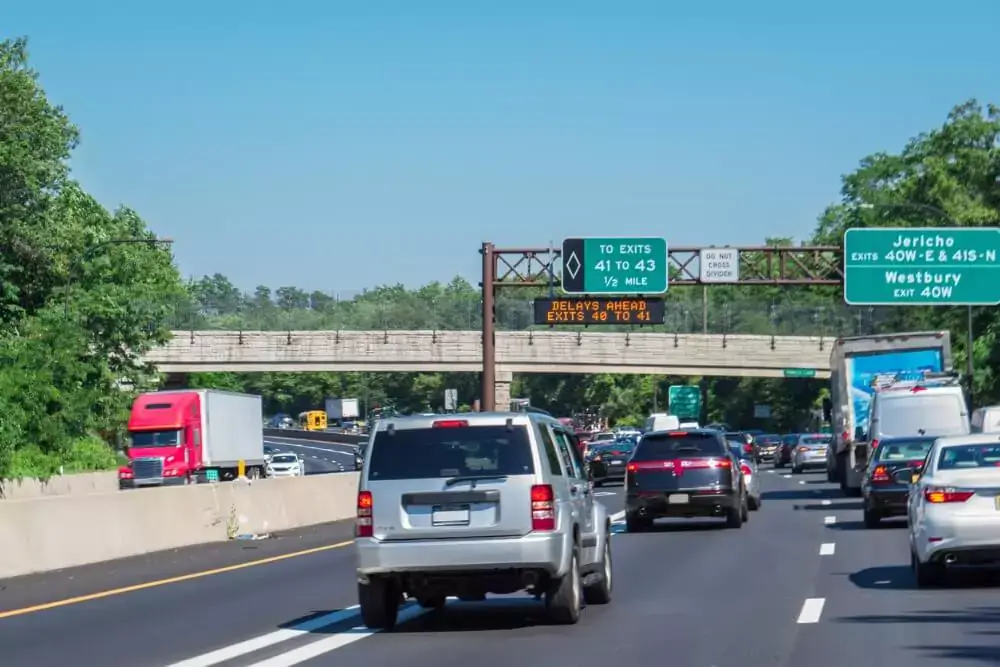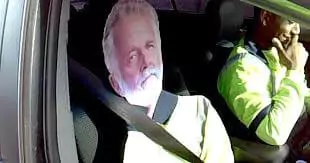
On certain highways in New York, specific lanes are designated for HOV, or High Occupancy Vehicles, only. This means more than one person in the vehicle at certain times of the day and days of the week. The one exception to the multiple occupants requirement is the NY Clean Pass program, which allows eligible energy-efficient vehicles to use the 40-mile Long Island Expressway HOV lanes regardless of the number of occupants in the vehicle.
New York City Traffic Rules Section 4-07(k) states that:
Wherever signs are erected on highways or bridges giving notice of express lanes, no person shall operate a vehicle other than a vehicle as specified in paragraph (2) of this subdivision, a medallion taxi or a for-hire vehicle with at least one passenger as specified in paragraph (3) of this subdivision, an emergency vehicle as specified in paragraph (4) of this subdivision, or a vehicle classified as an HOV, with or without EZPASS as specified on such sign, within a designated express lane on a highway or bridge during the hours specified on such signs.
For most people, the vehicles specified elsewhere in the traffic rules are those that have at least two people in them. If you violate the rules of HOV lanes, you could find yourself with an NYC traffic ticket.
An officer is unlikely to believe you are commuting to work with the most interesting man in the world

An officer is unlikely to believe you are commuting to work with the most interesting man in the world.
An HOV lane ticket in NY carries two points, except for violations relative to the improper use of high occupancy vehicle lanes in Suffolk County, between exits 49 and 57 of the Long Island Expressway. It is a zero-point violation there.
In general, violating HOV rules will result in a “disobeyed traffic control device” ticket. As such, the HOV lane ticket cost in NY is a $150 fine and a $93 surcharge, in addition to the license points listed above.
As a zero-point violation or a two-point violation, an HOV violation obviously not the biggest or most severe NYC traffic ticket one could get. Insurance companies would basically treat an HOV violation as a disobeying a traffic device or sign violation. It’s similar in severity to a typical “no turns 9a to 5p” or “no commercial vehicles” sign violation.
While many violations of signs such as these might not have caused any type of dangerous situation (HOV violations are a good example of this), insurance companies can’t distinguish between the less risky and riskier maneuvers that lead to violations. To an insurance company, it’s an instance of a driver not fully obeying the rules of the road which in general is indicative of a higher risk driver compared to one who has never committed any violations.
While it’s not a major violation on its own, an HOV lane ticket in NYC is certainly a violation that would register on an insurance company’s radar when reviewing a customer’s driving history.
In many Suffolk and Nassau County HOV lane violation cases, we’ll see multiple tickets issued in addition to the HOV ticket. Using the HOV lane requires:
Officers in Nassau and Suffolk Counties have clearly been instructed to issue as many of these violations as they see.
Entering or exiting at improper points means driving over the pavement markings separating the HOV lane from the lane next to it. This is often written as either a disobey traffic control device ticket or crossing hazard markings ticket — both are two-point violations. In addition, the fine for crossing the HOV lane in NY improperly is often over $100.
Failing to signal is a two-point ticket if the officer doesn’t observe a signal while moving into or out of the HOV lane. If the movement isn’t deemed safe by the officer, a three-point unsafe lane change ticket will be potentially added to the mix as well.
Whether you live here or you’re just visiting, getting a ticket for an HOV violation in NY can be a serious blow to your wallet. Depending on how many citations are added to your primary ticket, you could be looking at hundreds of dollars’ worth of fines and many points added to your license.
You may think it’s easiest to just pay your tickets and move on with your life, but you should know that you are well within your rights to fight your NYC traffic ticket. At Feiner & Greenberg, our lawyers have the skills and experience to potentially get your charges lessened — or even dropped altogether. Give us a call at (888) 842-5384 or contact us online for a free, no-obligation consultation today.
We have organized a statewide network of attorneys. In our network are both attorneys who work for Feifer & Greenberg and attorneys who work for other firms that regularly provide of-counsel representation to our clients. This statewide network allows us to match clients in a particular county or court with local attorneys who regularly appear on similar matters in the same county or court. It enables us to help clients anywhere in New York State and in our opinion provide particularly effective and affordable representation for our clients. Local attorneys can draw on their particular local experiences and, with travel time and expense removed from the equation, help us keep our legal fees low.
We recommend fighting almost all tickets. Even if the current NY traffic tickets aren’t particularly harmful, you have an incentive to keep your record clean for the future. Convictions quickly lead to surcharges, insurance increases and other complications. You should strongly consider any decision to pay a ticket without fighting.
Our lawyers are experienced, prepared attorneys who understand the nuances of fighting traffic tickets. Experience, preparation and good decision making help us to help our clients avoid points, surcharges, insurance increases and the other negatives that can easily result from a traffic ticket.
Feifer & Greenberg, LLP, 15 Maiden Lane, Suite 508, New York, NY 10038, (888) 842-5384
© 2023 | Privacy Policy